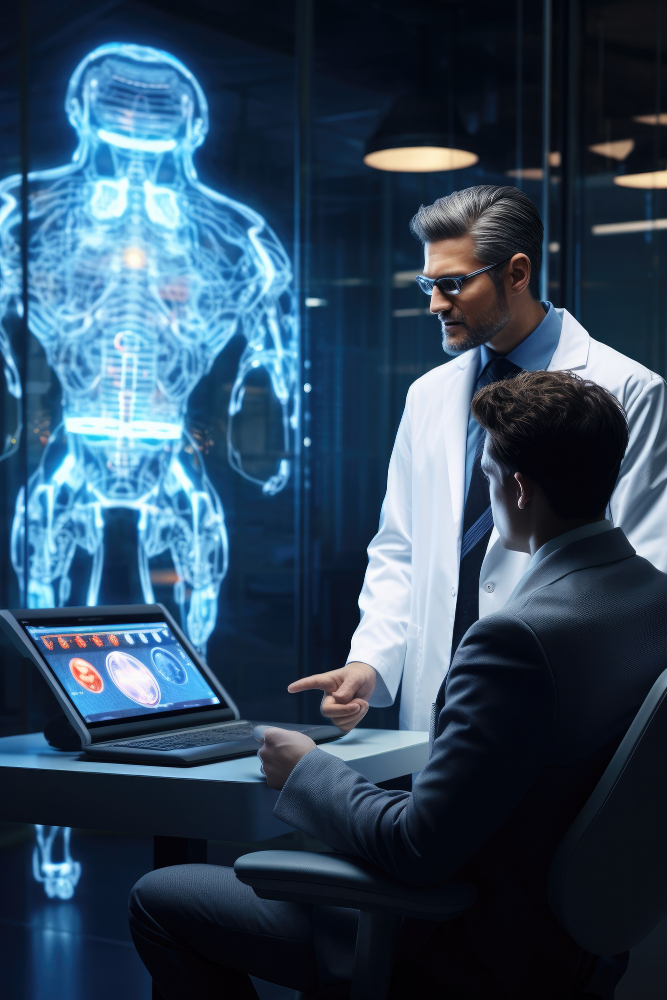Introduction
In the rapidly evolving healthcare landscape, digital health applications play a crucial role in improving patient experiences and outcomes. With the integration of generative AI in healthcare, these applications are becoming smarter, more intuitive, and increasingly personalized. Generative AI, powered by advanced machine learning models, has the potential to revolutionize patient-centric digital health solutions by enabling better diagnosis, treatment recommendations, and personalized patient engagement. In this blog, we will explore how generative AI is transforming healthcare applications, the benefits it offers, and the challenges that come with its adoption.
Understanding Generative AI in Healthcare
Generative AI refers to artificial intelligence systems that can create new content, insights, and predictions based on vast amounts of healthcare data. Unlike traditional AI models that rely on predefined rules and structured datasets, generative AI models can analyze complex patterns and generate meaningful recommendations. In healthcare, this technology is used to enhance decision-making, automate administrative processes, and provide patients with more accurate, real-time insights.
Key Applications of Generative AI in Patient-Centric Digital Health Apps
1. Personalized Treatment Plans
Generative AI can analyze patient medical histories, genetic data, and lifestyle factors to create customized treatment plans. By considering individual patient needs, these AI-driven recommendations enhance the effectiveness of therapies and improve health outcomes.
2. AI-Powered Virtual Assistants for Patient Engagement
Chatbots and virtual health assistants powered by generative AI can interact with patients in real time, answering queries, scheduling appointments, and providing medication reminders. These digital assistants improve patient adherence to treatment regimens and ensure seamless communication between patients and healthcare providers.
3. Automated Medical Documentation and Summarization
Generative AI can streamline administrative tasks by automatically summarizing patient interactions, transcribing medical notes, and generating reports. This automation reduces the workload on healthcare professionals, allowing them to focus more on patient care.
4. Enhanced Diagnostic Support
Generative AI models assist doctors by analyzing radiology scans, pathology reports, and lab results to detect diseases at an early stage. AI-driven diagnostics enhance the accuracy of medical assessments and speed up the decision-making process.
5. Predictive Analytics for Preventive Care
By analyzing patient data, generative AI can predict potential health risks and suggest preventive measures. This proactive approach helps in the early detection of chronic diseases and improves overall patient well-being.
6. Smart Drug Discovery and Development
Pharmaceutical companies use generative AI to accelerate drug discovery by predicting molecular structures, identifying potential compounds, and simulating clinical trials. This innovation reduces the time and cost involved in bringing new treatments to market.
Benefits of Generative AI in Healthcare Applications
- Improved Patient Experience: Personalized recommendations and AI-driven interactions enhance patient satisfaction.
- Enhanced Efficiency: Automation of documentation and administrative tasks reduces the burden on healthcare professionals.
- Better Decision-Making: AI-powered insights assist clinicians in making more accurate and timely decisions.
- Cost Savings: Reducing manual processes and streamlining workflows lead to significant cost savings for healthcare providers.
- Scalability: AI-driven solutions can cater to a large patient population without compromising on quality and efficiency.
Challenges and Ethical Considerations
Despite its transformative potential, the adoption of generative AI in healthcare comes with challenges:
- Data Privacy and Security: Handling sensitive patient data requires robust cybersecurity measures to prevent breaches.
- Regulatory Compliance: AI-driven healthcare applications must comply with industry regulations like HIPAA and GDPR.
- Bias and Fairness: AI models must be trained on diverse datasets to avoid biases in medical predictions.
- Integration with Legacy Systems: Healthcare institutions must ensure seamless integration of AI-powered tools with existing IT infrastructure.
Future of Generative AI in Healthcare
The future of generative AI in healthcare looks promising, with continuous advancements in AI algorithms, cloud computing, and data analytics. As healthcare providers embrace AI-driven solutions, we can expect a more personalized, efficient, and patient-centric healthcare ecosystem. However, addressing ethical concerns, ensuring transparency, and fostering collaboration between AI developers and medical professionals will be crucial for widespread adoption.
Conclusion
Generative AI is revolutionizing digital health applications by enhancing patient-centric care, streamlining administrative processes, and improving diagnostic accuracy. As this technology continues to evolve, healthcare providers must harness its potential while addressing ethical and regulatory challenges. By integrating generative AI in healthcare, organizations can drive innovation, optimize patient outcomes, and pave the way for a smarter, data-driven healthcare future.
For cutting-edge healthcare solutions powered by AI, Emorphis Health offers expert-driven services to help organizations implement AI-driven healthcare applications seamlessly. Connect with us today to explore how our AI-powered solutions can transform your digital health initiatives.





Comments